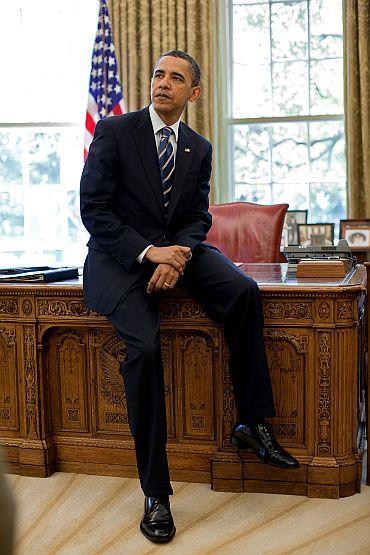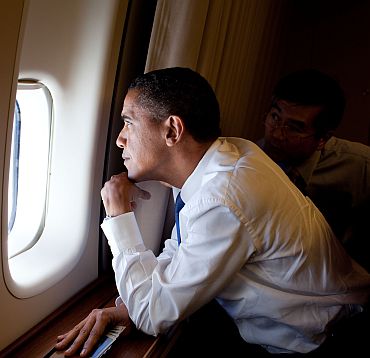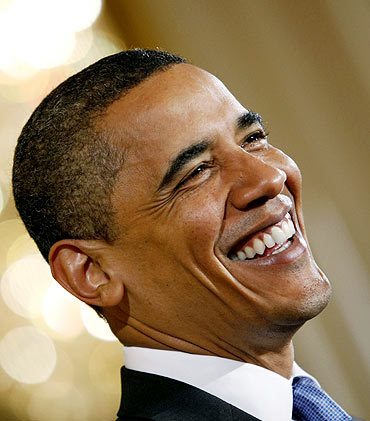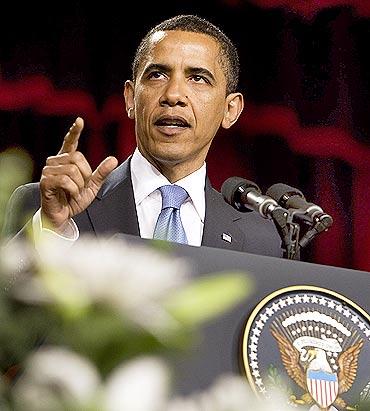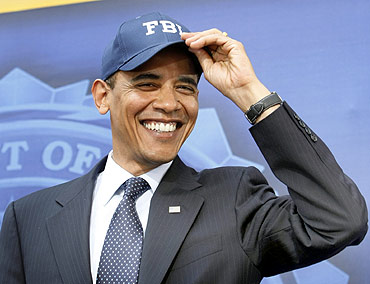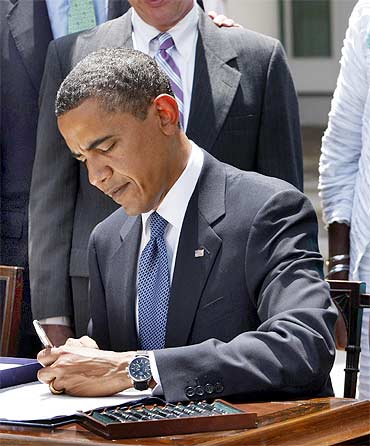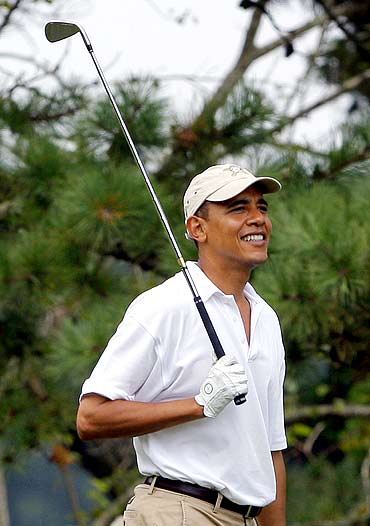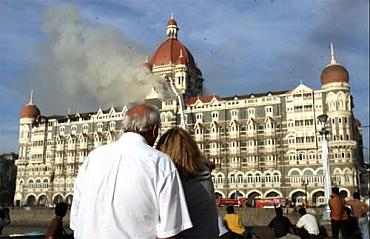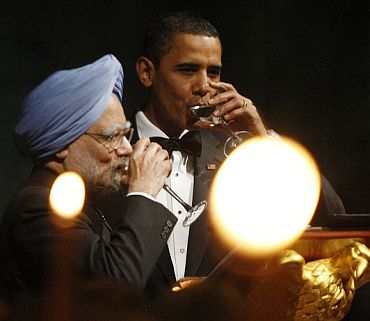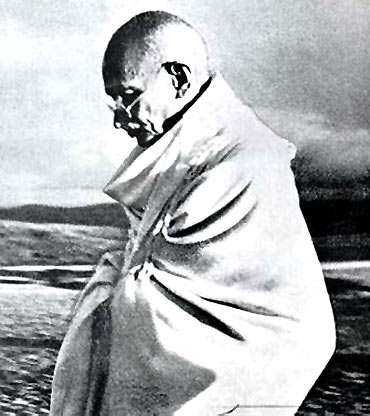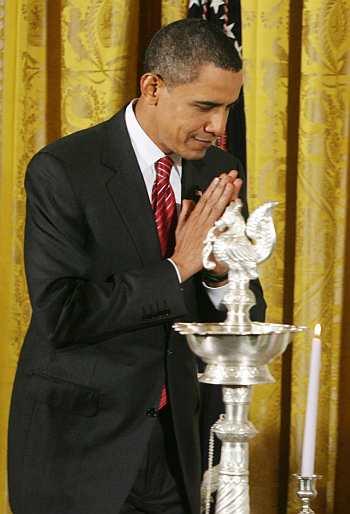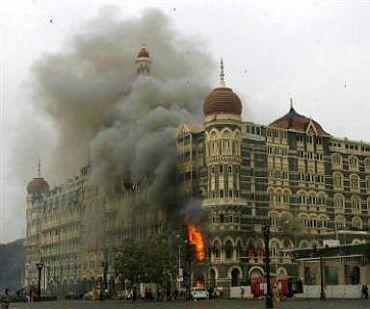 | « Back to article | Print this article |
Obama speaks up on what to expect from India trip
Ahead of his visit, United States President Barack Obama on Wednesday described India as a 'cornerstone' of US' engagement in Asia, but held out no assurances on key issues -- support for India's permanent membership of the United Nations Security Council and ending curbs on the export of dual-use technology.
Outlining the objectives of his three-day maiden trip beginning Saturday, Obama said that building 'a true strategic partnership' with India had been one of his 'highest foreign policy priorities' since he assumed office in January last year.
The visit would give him an opportunity to work with Prime Minister Manmohan Singh to bring Indo-US cooperation on a broad range of issues 'to a new level', he told PTI.
I welcome India's rise as a global power: Obama
The Indo-US partnership "is based on both our shared values and our shared interests, and for these reasons, I welcome and support India's rise as a global power", the President said.
India's rise "is in the best interests of both the countries (India and the US), of the region and the world," he said.
The President answered a wide range of questions covering contentious issues like US curbs on export of dual-use technology items, outsourcing, UNSC membership and Pakistan's failure to take action against the perpetrators of the 26/11 attacks.
Obama evades query on India's UNSC bid
Asked about the possibility of his announcing lifting of curbs on export of dual-use technology items and more concrete support for India's permanent membership of UNSC, Obama described the two issues as "very difficult and complicated".
"Our teams continue to work hard to reach an agreement that strengthens the international non-proliferation system while treating India in a manner that is consistent with our strategic partnership," he said in a reference to export restrictions that cover items which have both peaceful and military usage.
Without committing himself to a firmer support for India's bid for a permanent seat in UNSC, Obama said, "I do also expect to discuss India's role as an actor on the global stage during my visit."
'There will be big items on the agenda'
When told that there did not seem to be any 'big ticket items' on the agenda, Obama responded, "I do not want to pre-empt the announcements that the prime minister and I will make while I am in India. I think you can expect a series of announcements on how we are going to deepen and broaden our cooperation on a range of things that will have a direct and very positive impact on millions of people both in India and the United States."
"There will be big items on the agenda, and -- just as importantly -- I believe that we will build an even stronger foundation for the US-India partnership going forward," he said.
The President went on to emphasise that the Indo-US relationship "now goes well beyond any one particular issue".
'The enormously positive trajectory of US-India relations'
He said, "If you look at the breadth of everything we are working on now -- from economic engagement to counter terrorism and security cooperation, from clean energy to development it goes well beyond the type of cooperation that we pursued just a few years ago."
All this indicated "the enormously positive trajectory of US-India relations", Obama said.
Outlining his vision of a relationship between the two countries, the President said, "my vision is a US-India partnership in which we work together to shape a more secure, stable and just world. My visit gives me an opportunity to experience first hand your fascinating country, discuss issues of mutual concern with my friend Prime Minister Singh, and work with him to bring our cooperation on a broad range of issues to a new level."
'India is a cornerstone of America's engagement in Asia'
"It is also important that I am visiting India as the first stop on a major trip to Asia, as I see India as a cornerstone of America's engagement in Asia, just as it is fundamental to our engagement in multilateral forums like the G-20. To me, the US and India share an indispensable partnership, one that has benefits for both our countries and the world," said Obama.
Obama was asked about reports that the US companies were unhappy with some of the provisions of the Nuclear Liability Act passed recently by Parliament to enable the country to engage in nuclear commerce, and whether he would press New Delhi to review it.
'Indian officials are aware of our concerns'
He replied, "I have a deep respect for India's democratic process and I also continue to encourage the Indian government to provide domestic and international suppliers the opportunity to help India meet its ambitious nuclear power generation needs. I believe that Indian officials are aware of our concerns over the law that was recently passed by the Indian Parliament. These concerns are shared by many others, including some Indian officials and representatives of Indian industry.
"The important thing is that our governments are working together to discuss these concerns and resolve them. That is a demonstration of the strength of our partnership; how discussing our concerns brings us closer, instead of driving us apart," he said.
Pak has to punish 26/11 attackers urgently: Obama
President Barack Obama also asked Pakistan to bring to book 'transparently, fully and urgently' those responsible for the Mumbai terror attacks.
Answering criticism that Washington had not 'leaned enough' on Pakistan to deal with terrorism emanating from its soil, Obama said that the United States had taken every opportunity to make it clear to Pakistan that "confronting violent extremism of all sorts is in its own interests and in the interest of regional stability."
About the Mumbai attacks, the US leader said that Pakistan should fulfil its stated commitments to bring to justice those responsible for terrorism.
'Pakistan is taking important steps'
"Since the 26/11 Mumbai attacks, we have told the Pakistani government that they have an international responsibility to cooperate to bring the perpetrators to justice, and that there is a special responsibility to do so transparently, fully and urgently," he told PTI.
He said, "Pakistan is taking important steps and making sacrifices in our shared fight against extremism, and we will continue to underscore the importance of taking additional action to eliminate terrorist safe havens."
Obama also described his 'friend' Prime Minister Manmohan Singh as 'one of the most extraordinary leaders' he had met and said he greatly valued the Indian leader's 'friendship, wisdom and decency'.
'Dr Singh and I share many of the same values'
The two leaders have met several times since their first interaction about 20 months ago in London. Obama was asked about his equation with Dr Singh whom he will be meeting again in New Delhi next Monday.
"From our very first conversation in London, I have found that the prime minister and I share many of the same values, the same goals and the same vision for the well-being of our people," he told PTI.
Stating that he and his wife Michelle were both excited to go to India, Obama remarked, "one of the great joys of my visit to India is the opportunity to see the prime minister again."
Obama said, "Michelle and I were so pleased to host the prime minister and his wonderful wife (Gursharan Kaur) for our first state dinner (a year ago)."
'Gandhi's message had relevance for the entire world'
Obama believes that Mahatma Gandhi's message is still relevant for the world.
"Gandhi lived and worked for much of his life in India but his message had, and still has, relevance for the entire world," he told PTI. Obama, a great admirer of the Mahatma, was responding to a question on whether he believed Gandhiji's teachings still had relevance in today's world.
"In my own country, Gandhi's work had a profound influence on Dr Martin Luthar King and the extraordinary movement for civil rights that he helped to lead," he said.
In that respect, the President said Gandhi's work was "an inspiration for positive change in my own country and his example is something that I continue to admire."
'This is a chance to honour Gandhi's memory'
He recalled his speech while accepting the Nobel Peace Prize last year in which he had said "the non-violence practised by men like Gandhi and King may not have been practical or possible in every circumstance, but the love that they preached -- their faith in human progress -- must always be the North Star that guides us on our journey."
Obama said his trip to India is not only "a chance to honour Gandhi's memory, but also to honour and learn more about the modern India that he helped create."
President Barack Obama has chosen to stay at the Taj Hotel in Mumbai when he arrives on Saturday as a "tribute to the resilience of the Indian people" and to underscore the shared commitment of India and the US to counter terrorism.
'We have both been the victims of terrorism'
"By staying at the Taj (hotel), I am pleased to pay tribute to the resilience of the Indian people, while also underscoring our shared commitment to counter terrorism," Obama told PTI.
He was responding to a question as to what he was trying to convey by his gesture of landing in Mumbai and staying at the Taj Hotel, which was attacked by Pakistani terrorists in November 2008.
"One of the many things that our countries and our people have in common is that we have both been the victims of terrorism and we have both overcome it. Just like New York and Washington, Mumbai has shown an amazing resilience and demonstrated that free people cannot be defeated by terror," the President said.
He said it should not be forgotten that just as Indian citizens were killed in the attack on the World Trade Centre, six Americans were killed during the attack on Mumbai. Also, one of the victims of the attack on the American Embassy in Kenya in 1998 was an American diplomat who was born in India
"So Americans and Indians understand that terrorism can never be justified and must be defeated," he underlined.
